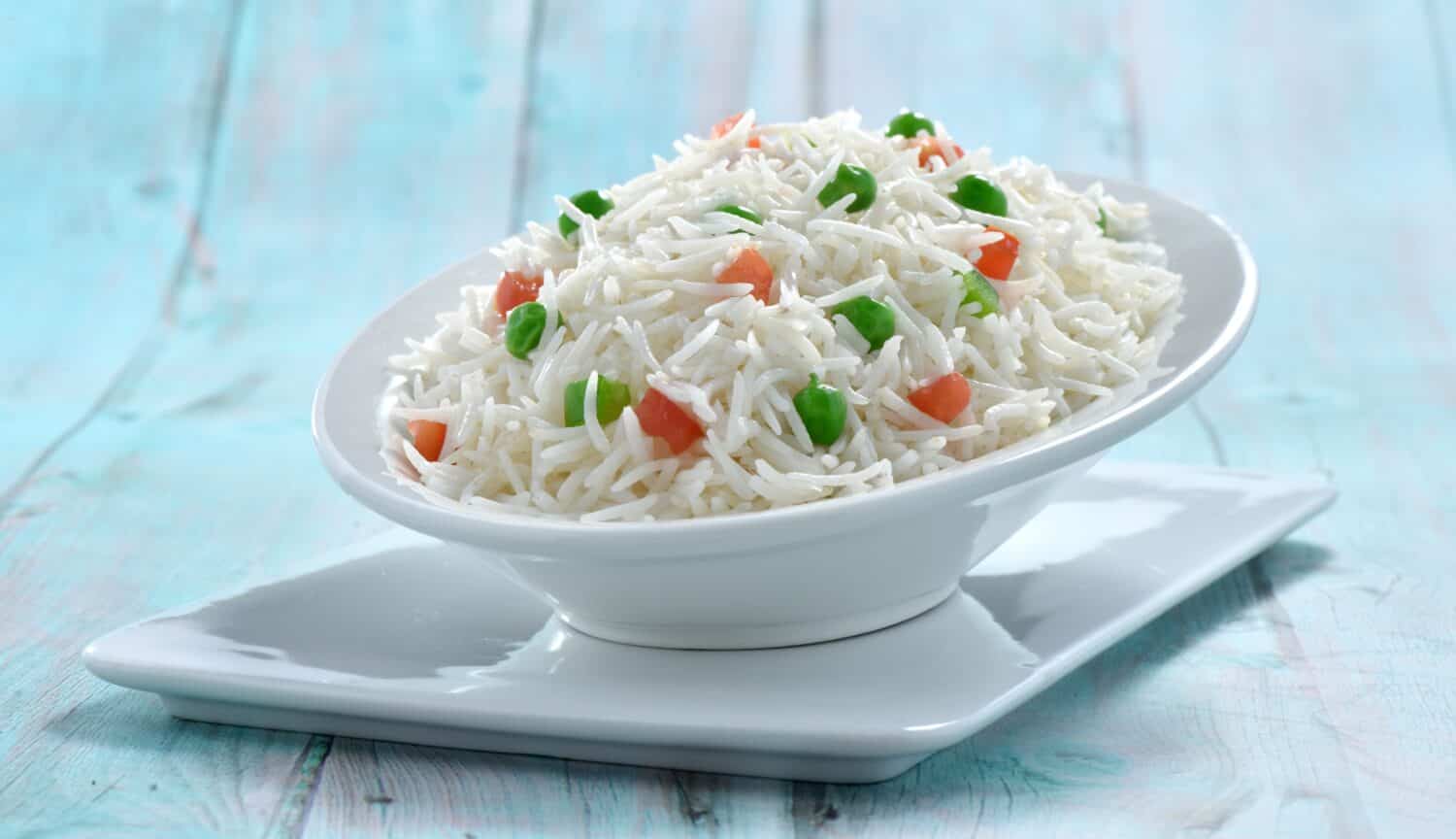What do you normally look for when choosing rice? The taste would probably top the list. There's something so delicate about the aromatic, nutty, floral flavor some rice contains. Then, of course, there is cooking convenience, as some cook faster than others. You’ll appreciate this characteristic if you lead a busy life.
Basmati and long-grain rice are popular choices for many rice lovers worldwide. But few would actually tell you the difference between the two, let alone distinguish them from each other.
Basmati vs. Long Grain Rice: What's the Difference?
What is Basmati Rice?
Basmati does belong to the long-grain rice category. Large-scale farming and production happen in the Himalayas, Pakistan, and India. The latter takes up 2/3 of the world's basmati rice supply.
History of Basmati Rice
History shows that we can thank Pakistani and Indian farmers for basmati rice. Mentions of the rice date back to a Punjabi poem written in 1776. Thus, we can assume that for the rice to be popular enough to mention in a poem, it must have existed for some time. Now, it's this exact time that seems to still baffle historians to date.
But we can say that people from the originating areas and the world over now consume this flavorful rice as a staple.
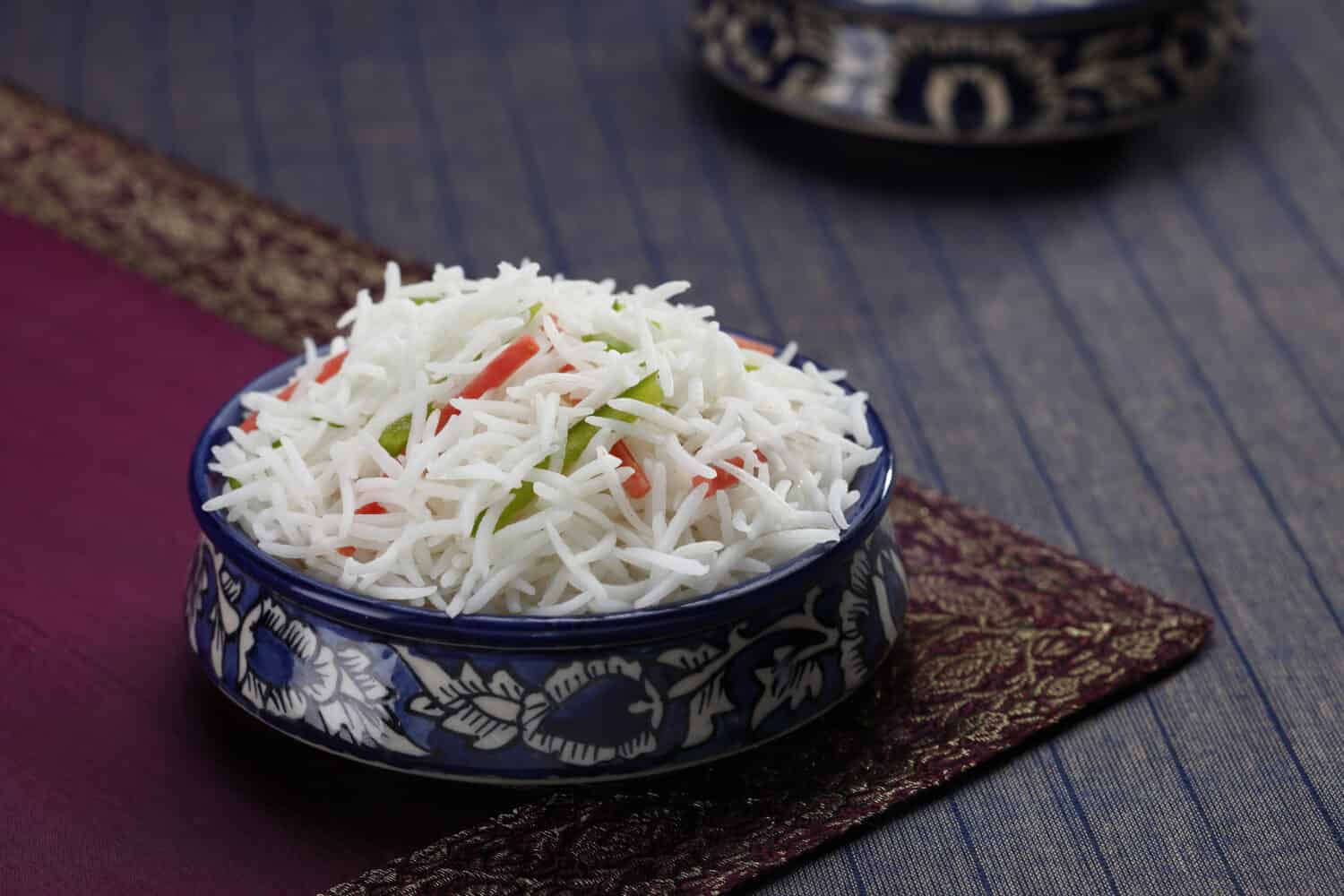
©mahakaal/Shutterstock.com
Basmati Rice Aroma
For the trained rice-smelling nose, it's easy to identify basmati rice from the other long grain types. It has a nutty, almost floral aroma. Some people would describe it as popcorn-like. We can thank the large presence of 2-acetyl-1-pyrroline compounds in the rice for the lovely, inviting smell wafting through your house every time you cook basmati. Other rice grains have the compound, but not at the same levels as basmati rice. Basmati is a popular addition to foods such as curries and pilaf.
Basmati Rice Appearance
Basmati grains are long and slender, thus the reference to them as long-grain rice. They are not the whitest rice variety, often taking on an off-white or light beige color. But it's not uncommon to find others having an amber or slightly golden hue.
Basmati Rice Nutritional Value
The US Department of Agriculture shares the basmati rice's nutritional value as follows.
- Calories 148
- Proteins 3.52g
- Carbohydrates 32.39g
- Fiber 0.7g
- Calcium 14 mg
- Potassium 42mg
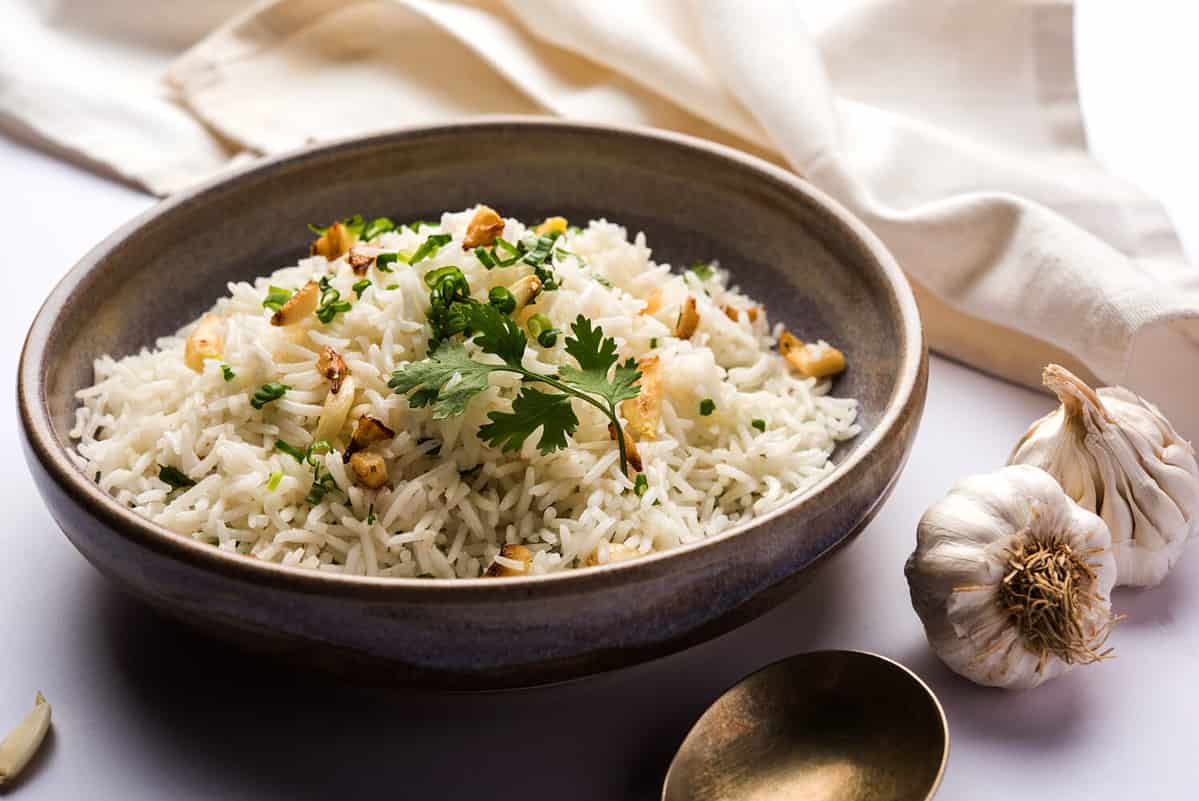
©StockImageFactory.com/Shutterstock.com
Basmati Rice Texture and Cooking Technique
If you know anything about cooking rice, the result typically depends on how much starch it contains. That's why culinary experts will tell you to first soak the rice, and then rinse it till the water runs clear.
Can you just rinse the basmati rice once and keep it moving? Well, yes, but get ready to deal with some unsightly sticky rice. What will you do with a whole pot no one wants to eat?
Basmati rice is quite forgiving in its starch content. So it won't test your cooking too much. What you eventually get is a light, fluffy, yet firm texture. You'll also notice that the rice grains don't stick together.
Now, talking about cooking Basmati rice without giving you some helpful tips wouldn't be fair. So here's a simple, fail-proof recipe that will give you a delightful plate of rice every time.
Ingredients
- 1 cup of basmati rice
- 1 and 1/2 cups of water
- Salt to taste.
- Rinse the rice repeatedly until the water runs clear
- Time allowing, soak the rice for about 30 minutes. If you don't have enough time, ensure you do step one properly.
- In a pot, add a cup of rice and water. Is it necessary to start with boiling water? Well, it depends, as either hot or cold will work. Boiling the water can save you some time. But there is the concern about the rice overcooking and turning mushy. Why bother with the extra step when cold water works just fine?
- Turn down the heat to low. Now, use the lid to cover the pot and let the rice simmer till tender. Minimize lifting the top to check progress, but keep an eye so the rice doesn't overcook or burn. You have 15 to 20 minutes to work on the other dishes as your rice cooks to perfection.
- Switch off the fire. Now, fluff the top using a fork, and let the rice sit for another 5 to 10 minutes for that perfect finish. Kind of like how you would let your steak sit for some time before slicing into it. There's an idea right there, rice, steak, some sauce on the side, and of course, a generous serving of healthy vegetables.
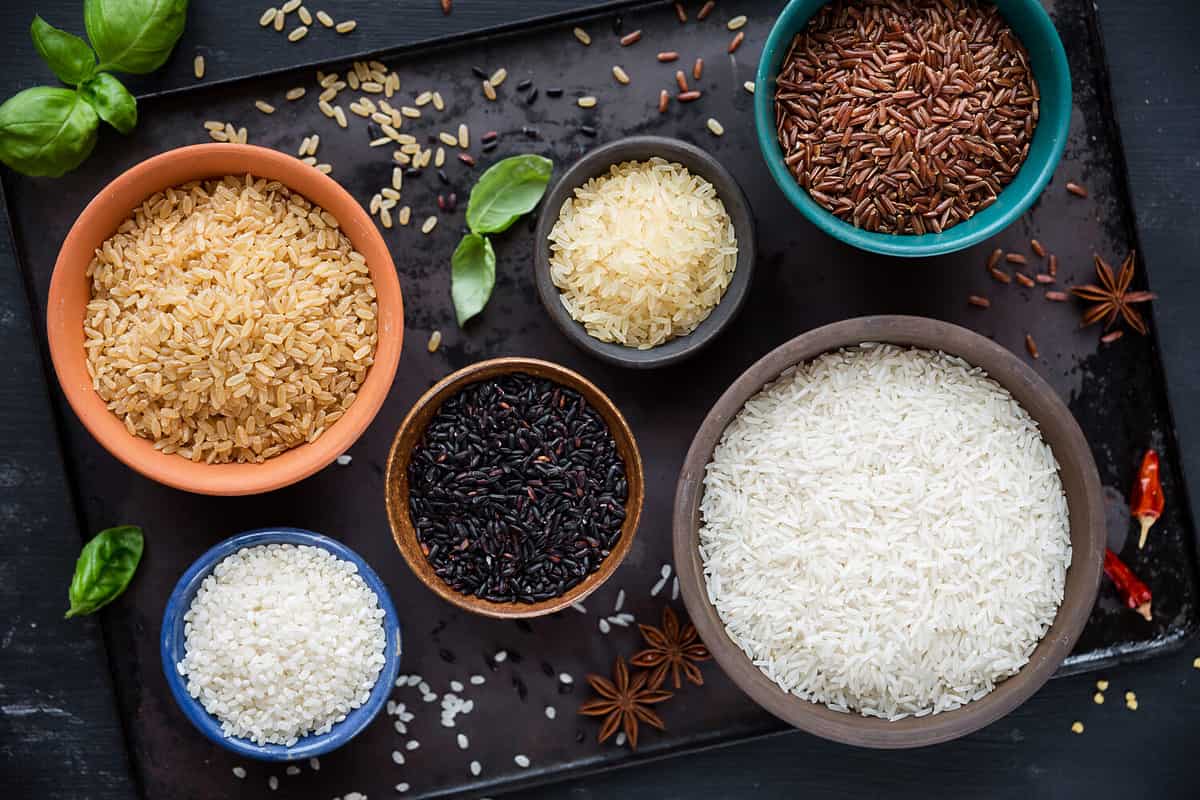
©kuvona/Shutterstock.com
What is Long Grain Rice?
The origin of the name should be pretty clear, as it describes its appearance. A single grain can be about 9 mm in length. The simplest description of long-grain rice is one whose length is four or five times larger than the width.
There're many types of long-grain rice, each with distinct characteristics. You may know popular types like Basmati, Jasmine, ST25, Horn Mali, and Carolina rice.
History of Long Grain Rice
The exact history of long-grain rice seems hard to find, almost like precise times have not been documented. Like in the case of basmati, cultivars may have come from the original Oryza Sativa var. Indica. However, rice cultivation and consumption have been going on for over 2,000 years. The original rice farmers were in China and India. From there, rice spread to other parts of the world, including Asia, Europe, Africa, and America.
Long Grain Rice Nutritional Value
As per the University of Rochester, long grain rice's nutritional value per cup is as follows.
- Calories 194.34
- Proteins 4.6g
- Carbohydrates 41.16g
- Fiber 1.42g
- Calcium 30.02 mg
- Potassium 88.48
- Sodium 3.16
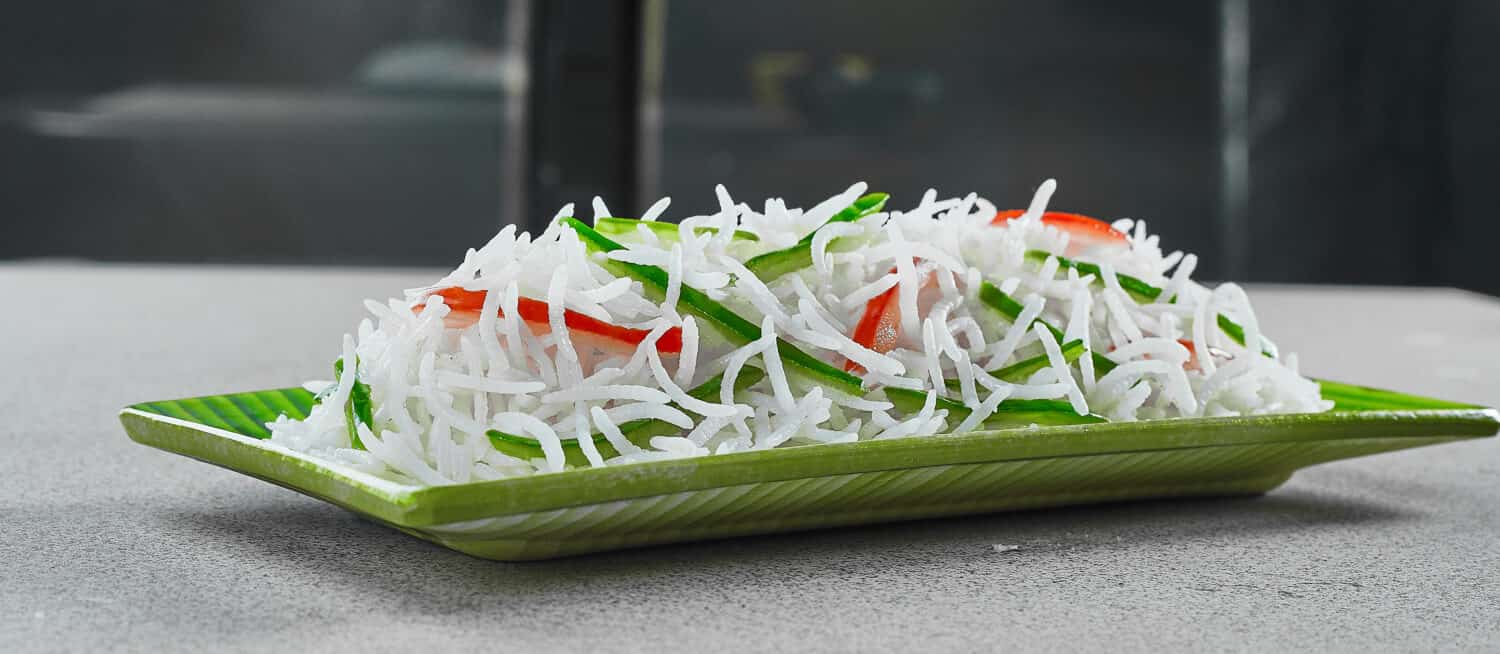
©Pitamaas Agency/Shutterstock.com
Long Grain Rice Aroma
You'll find that each type of long-grain rice has its aroma. Jasmine, for example, has a more floral smell than the nutty smell that you'd find in the other varieties. Basmati rice also has a distinct smell that sets it apart from other long-grain types. Others have mild to neutral aromas.
Several factors will contribute to the rice aroma, most significantly where it's cultivated. Storage and cooking styles will also affect the final smell. The inclusion of spices, for instance, can overpower the natural rice aroma.
Long Grain Rice Texture and Cooking Technique
The texture of long-grain rice is fluffy, firm, and tender. This is significantly different from medium grain rice, which remains rather moist and tender while short grain clumps together, thus earning the name glutinous rice. Glutinous rice is more a reference to the sticky or glue-like texture rather than the presence of gluten, which rice does not contain.
Use the same cooking technique we shared for basmati rice above for other long-grain rice varieties. If you go for the brown rice, increase the water to 2 and ¼ cups. Brown rice will take longer to cook, thus the need for more water.
Basmati Rice Substitute
Get the same flavor and taste with the following basmati rice substitutes.
Jasmine Rice
Jasmine rice is a long-grain variety with a nutty and floral flavor, much like basmati rice.
Texmati Rice
Texmati rice is a hybrid of American long-grain rice and basmati. Though shorter in length, the flavor and aroma are similar to basmati rice.
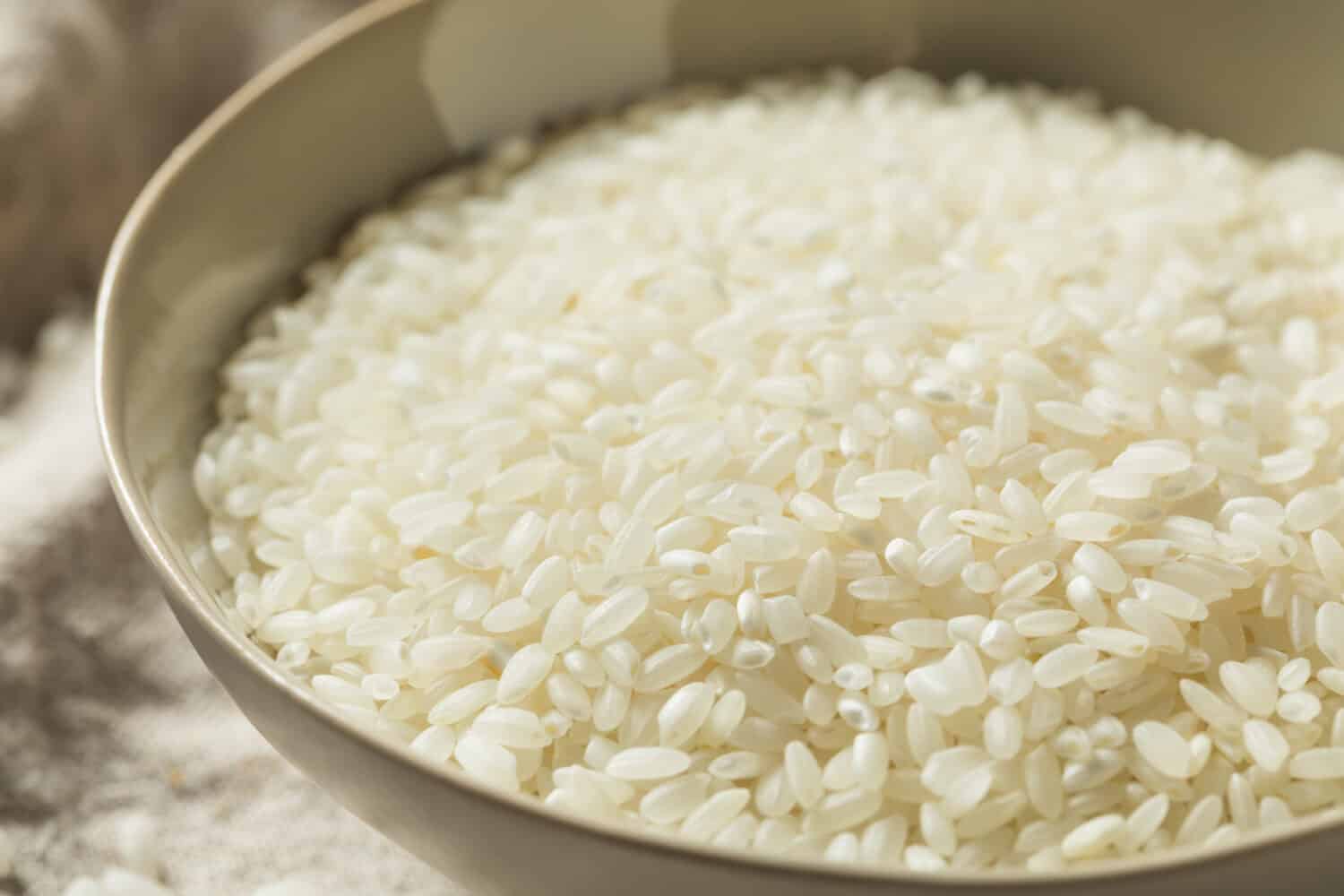
©Brent Hofacker/Shutterstock.com
Carolina Rice
Carolina rice is another long-grain variety. While the flavor and aroma are less present than in basmati rice, it can be an excellent substitute.
Brown Rice
Brown rice has a nutty and chewy texture infused with earthy flavors. You don't get the same fragrances as basmati rice. But the nutritional value more than makes up for its shortcomings.
Long Grain Rice Substitutes
If you can't get any long-grain rice varieties, try the following substitutes.
Wild Rice
Despite the name, wild rice is a seed from California grass. It is brown, sometimes black, with a chewy, nutty flavor.
Couscous
Couscous is a pastor that comes from semolina flour. The texture is similar to rice, making it an excellent, delicious substitute for stews and salads.
Orzo
Orzo or risoni is a pasta that looks a lot like rice, thus referring to it as little rice in Italy. Like couscous, it comes from semolina flour and provides a lot of versatility as a side dish.
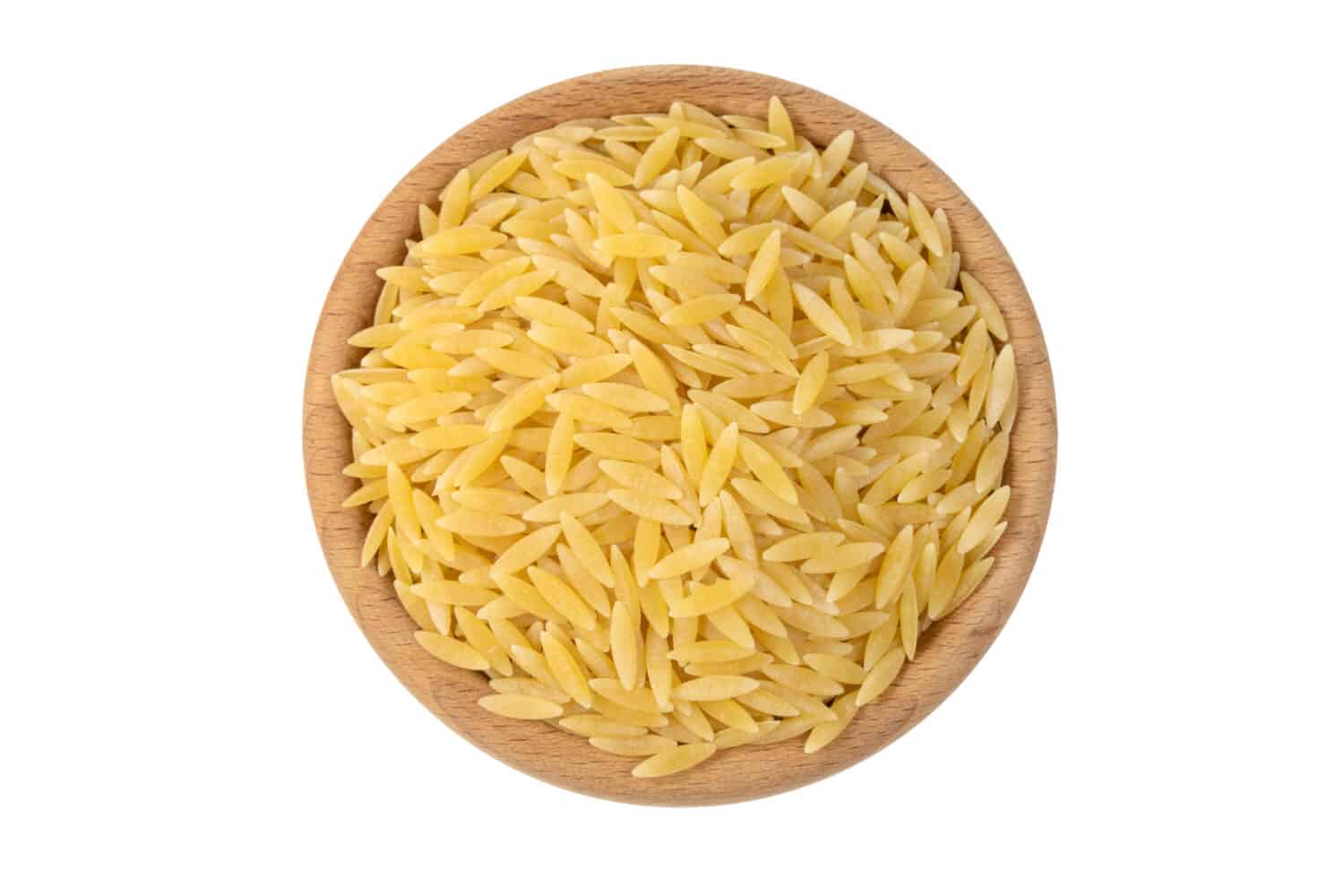
©difenbahia/Shutterstock.com
Bulgur
Bulgur or cracked wheat has a chewy texture and nutty flavor. It's an excellent long-grain rice substitute for dishes like salads and pilaf.
Long Grain Rice Recipes to Try
Try out some of these rice recipes for wonderful tasty dishes:
Print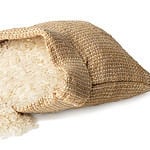
Savory Rice and Veggie Casserole
- Yield: 6 servings 1x
Ingredients
2 large green peppers, chopped
2 cups sliced fresh mushrooms
1 medium onion, chopped
¾ cup water
1½ teaspoons canola oil
2 garlic cloves, minced
1 can (28 ounces) diced tomatoes, undrained
1 can (16 ounces) kidney beans, rinsed and drained
¾ cup uncooked long grain rice
2 teaspoons ground cumin
1 teaspoon chili powder
¼ teaspoon salt
¼ teaspoon cayenne pepper
1 cup (4 ounces) shredded part-skim mozzarella cheese, divided
Instructions
1. Preheat oven to 350°. In a large nonstick frying pan, sauté green peppers, mushrooms and onion in water and oil until tender.
2. Add garlic and cook 1 minute longer.
3. Add tomatoes, beans, rice, cumin, chili powder, salt and cayenne pepper. Bring to a boil.
4. Reduce heat. Cover and simmer 25 minutes or until rice is tender and most of the liquid is absorbed.
5. Remove from heat and stir in ½ cup of the cheese.
6. Transfer to a 2½ quart baking dish coated with cooking spray.
7. Sprinkle with remaining cheese. Bake, uncovered, for 15 minutes or until cheese is melted.
Nutrition
- Serving Size: 1⅓ cups
- Calories: 260
- Sodium: 523mg
- Fat: 9.5g
- Saturated Fat: 3g
- Carbohydrates: 44g
- Fiber: 9.5g
- Protein: 14g
- Cholesterol: 11mg
Basmati and Long Grain Rice Are Both Excellent Choices
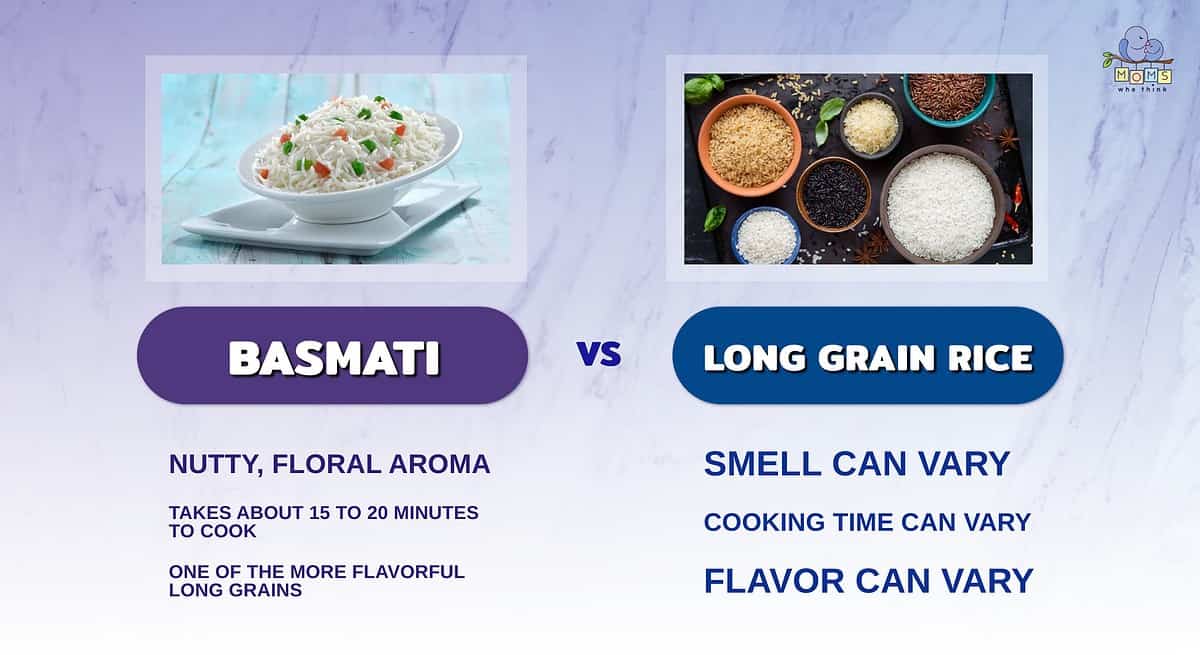
- Basmati has a nutty, floral aroma that a trained nose can distinguish from other rice types. Other types of long grain rice can vary in aroma, but usually trend towards floral or nutty.
- Some varieties of long grain rice can take longer to cook, while basmati takes about 15 to 20 minutes to cook. Keep in mind that the rice has to be prepped prior to this.
- Basmati is one of the more flavorful long grain rice varieties; the flavor of other types can vary.
Whether you go for basmati or any other long-grain rice variety, you'll have a delicious meal at the end of the day. Basmati rice is one of the more aromatic and flavorful long-grain varieties. It's easy to cook as the low starch content ensures the rice doesn't stick together.
Stick to simpler main dishes to truly experience the wonderful taste of aromatic rice. Also, avoid over-seasoning so that you don't over-power the rice. And, if you're running out of ideas, then don't hesitate to try out the fantastic recipes we've shared above.
The image featured at the top of this post is ©highviews/Shutterstock.com.
